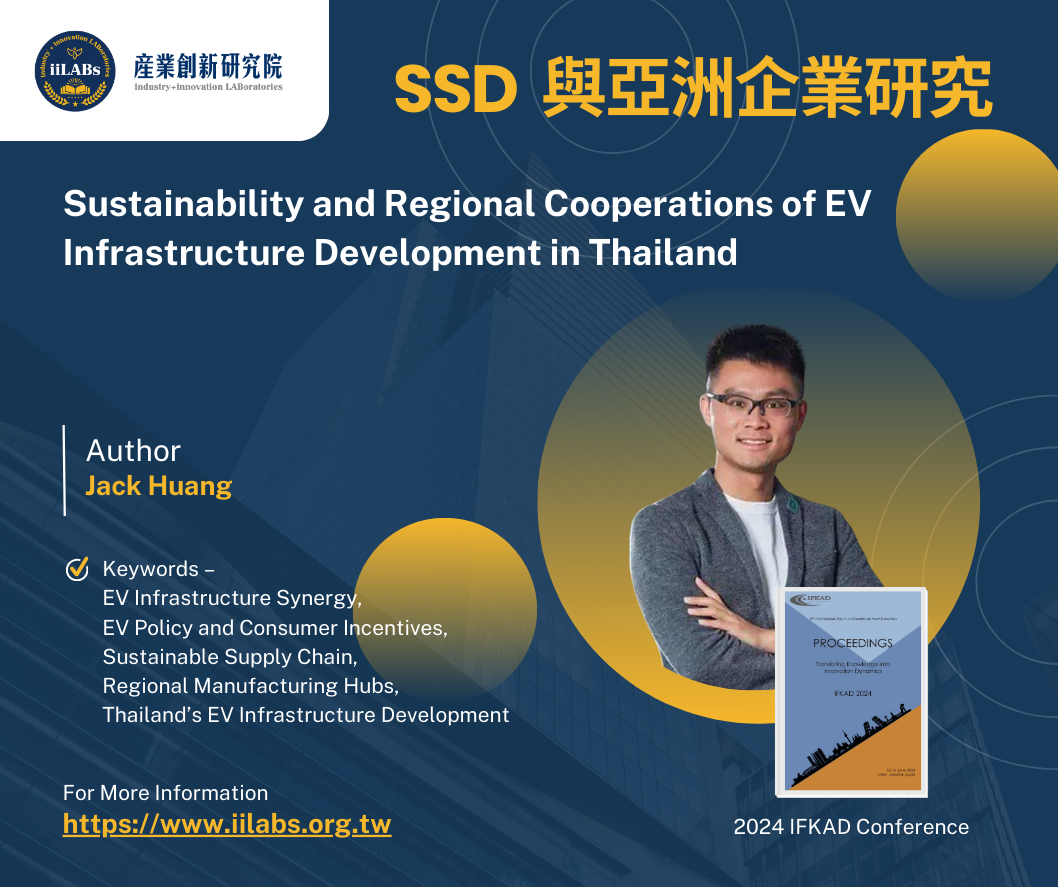


📙論文名稱:
Sustainability and Regional Cooperations of EV Infrastructure Development in Thailand
📙刊登處:2024 IFKAD國際學術研討會
📙作者姓名: Jack Huang
論文摘要:
The pivotal role of Electric Vehicle (EV) infrastructure in regional economies is increasingly acknowledged as the linchpin of sustainable development, particularly in burgeoning markets like Thailand. The kingdom’s commitment to greening its transport sector, with active players such as ESPRO leading the charge, is rapidly transforming the urban landscape and positioning Thailand as a potential leader in the Asian EV market. This essay presents an expansive analysis of the confluence of factors that shape the EV infrastructure in Thailand, from policy and consumer behavior to supply chain logistics and regional cooperation.
Underpinning Thailand’s rise in the EV domain is a robust policy framework that incentivizes the adoption of EVs and the build-out of requisite charging infrastructure. Such policy measures, ranging from tax breaks for EV manufacturers to subsidies for consumers, have catalyzed an environment ripe for growth. The role of private sector pioneers, particularly ESPRO, in harnessing these incentives to establish expansive networks of charging stations is scrutinized, revealing a model for regional replication. The analysis further dissects the consumer behavior patterns in Thailand, illuminating the market’s readiness and enthusiasm for a transition to electric mobility.
A substantial portion of the essay is dedicated to the intricate web of supply chain opportunities and challenges inherent in the EV industry. It evaluates how Thailand's established automotive manufacturing base can be leveraged to create a vibrant EV supply chain, while also acknowledging the hurdles such as raw material procurement and the need for skilled labor. The potential of Thailand’s geographical and economic positioning within ASEAN is explored as a catalyst for regional supply chain integration, providing a comprehensive view of how local advancements can have a ripple effect throughout Southeast Asia.
The essay delves into the critical role of regional cooperation in accelerating the development of EV infrastructure, with emphasis on the need for harmonized standards, cross-border policy alignment, and collaborative initiatives such as the ASEAN Electric Vehicle Regulatory Framework. Such cooperation is not only instrumental in overcoming logistical and regulatory barriers but also pivotal in establishing a uniform market that can attract further investment and innovation.
Furthermore, the essay explores the emerging business models and strategic partnerships shaping the future of Thailand’s EV landscape, highlighting ESPRO’s initiatives as quintessential examples. It posits that Thailand’s concerted push towards electrification, backed by strategic partnerships and regional alliances, presents an opportunity to redefine the paradigms of urban mobility and industrial collaboration.
In this vein, the essay contends that Thailand’s progression towards an integrated and sustainable EV infrastructure is not merely a national endeavor but a regional opportunity. It underscores how the establishment of a green transportation network serves as a foundation for broader economic transformation and sustainability initiatives. The discourse on Thailand’s pursuit of an EV-driven future ultimately converges on a vision where economic growth, environmental stewardship, and technological innovation are inextricably linked, heralding a new era of green prosperity in Asia.